
robocorp
Create 🐍 Python AI Actions and 🤖 Automations, and deploy & operate them anywhere
Stars: 501

Robocorp is a platform that allows users to create, deploy, and operate Python automations and AI actions. It provides an easy way to extend the capabilities of AI agents, assistants, and copilots with custom actions written in Python. Users can create and deploy tools, skills, loaders, and plugins that securely connect any AI Assistant platform to their data and applications. The Robocorp Action Server makes Python scripts compatible with ChatGPT and LangChain by automatically creating and exposing an API based on function declaration, type hints, and docstrings. It simplifies the process of developing and deploying AI actions, enabling users to interact with AI frameworks effortlessly.
README:
Docs | Blog | Examples | ReMark | Courses | Slack | Youtube | 𝕏
Robocorp is the easiest way to extend the capabilities of AI agents, assistants and copilots with custom actions, written in Python. Create and deploy tools, skills, loaders and plugins that securely connect any AI Assistant platform to your data and applications.
Robocorp Action Server makes your Python scripts compatible with ChatGPT and LangChain by automatically creating and exposing an API based on function declaration, type hints and docstrings. Just add @action and start!

Looking for a replacement to RPA? Head over to our Enterprise Python Automation site for more.
There are two main ways using the Action Server: use with our Robocorp Code extension for VS Code, or DIY from the command line. This section gets you going!
Robocorp Code extension for VS Code
After installing Robocorp Code extension from the VS Code Markeplace, open the Command Palette (Command-Shift-P or Ctrl-Shift-P) and select Robocorp: Create Action Package. This will bootstrap a new project. You can then run/debug indvidual Actions from the Extension's sidebar, or start the Action Server.
CLI For macOS
brew update
brew install robocorp/tools/action-serverCLI For Windows
# Download Robocorp Action Server
curl -o action-server.exe https://downloads.robocorp.com/action-server/releases/latest/windows64/action-server.exeYou can download/move the executable into a folder that is in your PATH, or you can add the folder into PATH so that you can call action-server wherever you are.
CLI For Linux
# Download Robocorp Action Server
curl -o action-server https://downloads.robocorp.com/action-server/releases/latest/linux64/action-server
chmod a+x action-server
# Add to PATH or move to a folder that is in PATH
sudo mv action-server /usr/local/bin/Bootstrap a new project from a template. You’ll be prompted for the name of the project:
action-server newNavigate to the freshly created project folder and start the server:
cd my-project
action-server start --expose👉 You should now have an Action Server running locally at: http://localhost:8080, to open the web UI.
👉 Using the --expose -flag, you also get a public internet-facing URL (something like twently-cuddly-dinosaurs.robocorp.link) and an API key. These are the details that you need to configure your AI Agent.
Head over to Action Server docs for more.
1️⃣ package.yaml file that describes the set of Actions your are working on, and defines up your Python environment and dependencies:
name: Package name
description: Action package description
version: 0.0.1
documentation: https://github.com/...
dependencies:
conda-forge:
- python=3.10.12
- pip=23.2.1
- robocorp-truststore=0.8.0
pypi:
- robocorp=1.6.1
- robocorp-actions=0.0.7
- pytz=2023.3🙋♂️ "Why not just pip install...?"
Think of this as an equivalent of the requirements.txt, but much better. 👩💻 With package.yaml you are not just controlling your PyPI dependencies, you control the complete Python environment, which makes things repeatable and easy.
👉 You will probably not want run the Actions just on your machine, so by using package.yaml:
- You can avoid
Works on my machine-cases - You do not need to manage Python installations on all the machines
- You can control exactly which version of Python your automation will run on
- ..as well as the pip version to avoid dependency resolution changes
- No need for venv, pyenv, ... tooling and knowledge sharing inside your team.
- Define dependencies in package.yaml let our tooling do the heavy lifting.
- You get all the content of conda-forge without any extra tooling
This is courtesy of another open-source project of ours, RCC.
2️⃣ @action decorator that determines the action entry point and Type hints and docstring to let AI agents know what the Action does in natural language.
@action
def greeting(name: str) -> str:
"""
Greets the user
Args:
name (str): The user name
Returns:
str: Final user greeting
"""Once you have started the Action Server with --expose flag, you’ll get a URL available to the public, along with the authentication token. The relevant part of the output from the terminal looks like this, of course with your own details:
...
Uvicorn running on http://localhost:8080 (Press CTRL+C to quit)
🌍 URL: https://seventy-six-helpless-dragonflies.robocorp.link
🔑 Add following header api authorization header to run actions: { "Authorization": "Bearer xxx_xxx" }Adding the Action Server-hosted AI Action to your custom GPT is super simple: basically just navigate to “Actions” section of the GPT configuration, add the link to import the actions, and Add Authentication with Authentication method set to “API key” and Auth Type to “Bearer”.
TIP:
Use the@action(is_consequential=False)flag to avoid the user needing to accept the action execution separately each time on your GPT.
Add Action Server as a Toolkit to 🦜️🔗 LangChain
Robocorp Action Server has everything needed to connect it to your Langchain AI app project. The easiest way is to start with the template provided in the Langchain project. Here’s how to do it:
# Install LangChain cli tool if not already there
pip install langchain-cli
# Create a new LangChain app using Action Server template
langchain app new my-awesome-app --package robocorp-action-serverThen define the route inside the created ./my-awesome-app/app/server.py file:
from langserve import add_routes
+ from robocorp_action_server import agent_executor as action_server_chain
# Edit this to add the chain you want to add
- add_routes(app, NotImplemented)
+ add_routes(app, action_server_chain, path="/robocorp-action-server")After the setup make sure you have:
- An environment variable
OPENAI_API_KEYwith your OpenAI API key set - You have a running Action Server at http://localhost:8080
Finally, inside the project directory ./my-awesome-app spin up a LangServe instance directly by:
langchain serveAfter running the steps above, you’ll have a Playground available at http://127.0.0.1:8000/robocorp-action-server/playground/ where you can test your Actions with an AI agent.
Want to build your own thing? Adding your Robocorp AI Actions to a Langchain project is as easy as the code below. Just remember to change the URL of the Action Server if you are not running both the Action Server and Langchain app on the same machine.
from langchain_robocorp import ActionServerToolkit
# Initialize Action Server Toolkit
toolkit = ActionServerToolkit(url="http://localhost:8080")
tools = toolkit.get_tools()- ❤️ “when it comes to automation, the Robocorp suite is the best one” /u/disturbing_nickname
- ❤️ “Robocorp seems to be a good player in this domain” /u/thankred
- ❤️ “Since you know Python, check out Robocorp. Their product is crazy good.” /u/Uomis
Robocorp stack is hands down the easiest way to give AI agents more capabilities. It’s an end-to-end stack supporting every type of connection between AI and your apps and data. You are in control where to run the code and everything is built for easiness, security, and scalability.
- 🔐 Decouple AI and Actions that touches your data/apps - Clarity and security with segregation of duties between your AI agent and code that touches your data and apps. Build
@actionand use from multiple AI frameworks. - 🏎️ Develop Actions faster with
robocorpautomation libraries - Robocorp libraries and the Python ecosystem lets you act on anything - from data to API to Browser to Desktops. - 🕵️ Observability out of the box - Log and trace every
@actionrun automatically without a singleprintstatement. Pro tip: connect LangSmith traces with Action logs! - 🤯 No-pain Python environment management - Don't do this. Robocorp manages a full Python environment for your actions with ease.
- 🚀 Deploy with zero config and infra - One step deployment, and you'll be connecting your
@actionto AI apps like Langchain and OpenAI GPTs in seconds.
Check out these example projects for inspiration.
- 🐣 Simplest possible AI Action
- 🤡 Get a random joke or jokes per theme. Showcases how easy it is to work with APIs.
- 🕸️ Open a local Playwright browser and make some Google searches.
- 🖥️ Securely fetch contents of
.txtand.pdffiles from your local machine's folder in real time.
Build more @actions and be awesome! We'd love to hear and see what have you built. Join our Slack community to share your work, or post it in the Discussions. We'll soon start showcasing the best from the community here!
- [x]
Action Serverbrew installfor Mac users - [x]
Expose actions to public URL - [x]
Resume previously exposed session - [x]
Run and debug@actionslike@taskswith Robocorp VS Code Extension - [x]
Support JSON/Dicts for inputs and outputs - [ ] Docstring to OpenAPI specs improvements #236, #250
- [ ] Action can access request headers #167
- [ ] MS Copilot Studio manifest file support
- [ ] Action Gallery for prebuilt actions
- [ ] Llamaindex Tools support
- [ ] Link and deploy Action Servers to Control Room
- [ ] Hot reload of actions after a change
- [ ] Explicit action user approval
- [ ] Stateful actions
⭐️ First, please star the repo - your support is highly appreciated!
- 🚩 Issues – our GitHub Issues is kept up to date with bugs, improvements, and feature requests
- 🙋 Help - you are welcome to join our Community Slack if you experience any difficulty getting setup
- 🌟 Contribution and recognition – Start here, PR's are welcome!
- 🔐 Refer to our Security policy for details
For Tasks:
Click tags to check more tools for each tasksFor Jobs:
Alternative AI tools for robocorp
Similar Open Source Tools

robocorp
Robocorp is a platform that allows users to create, deploy, and operate Python automations and AI actions. It provides an easy way to extend the capabilities of AI agents, assistants, and copilots with custom actions written in Python. Users can create and deploy tools, skills, loaders, and plugins that securely connect any AI Assistant platform to their data and applications. The Robocorp Action Server makes Python scripts compatible with ChatGPT and LangChain by automatically creating and exposing an API based on function declaration, type hints, and docstrings. It simplifies the process of developing and deploying AI actions, enabling users to interact with AI frameworks effortlessly.
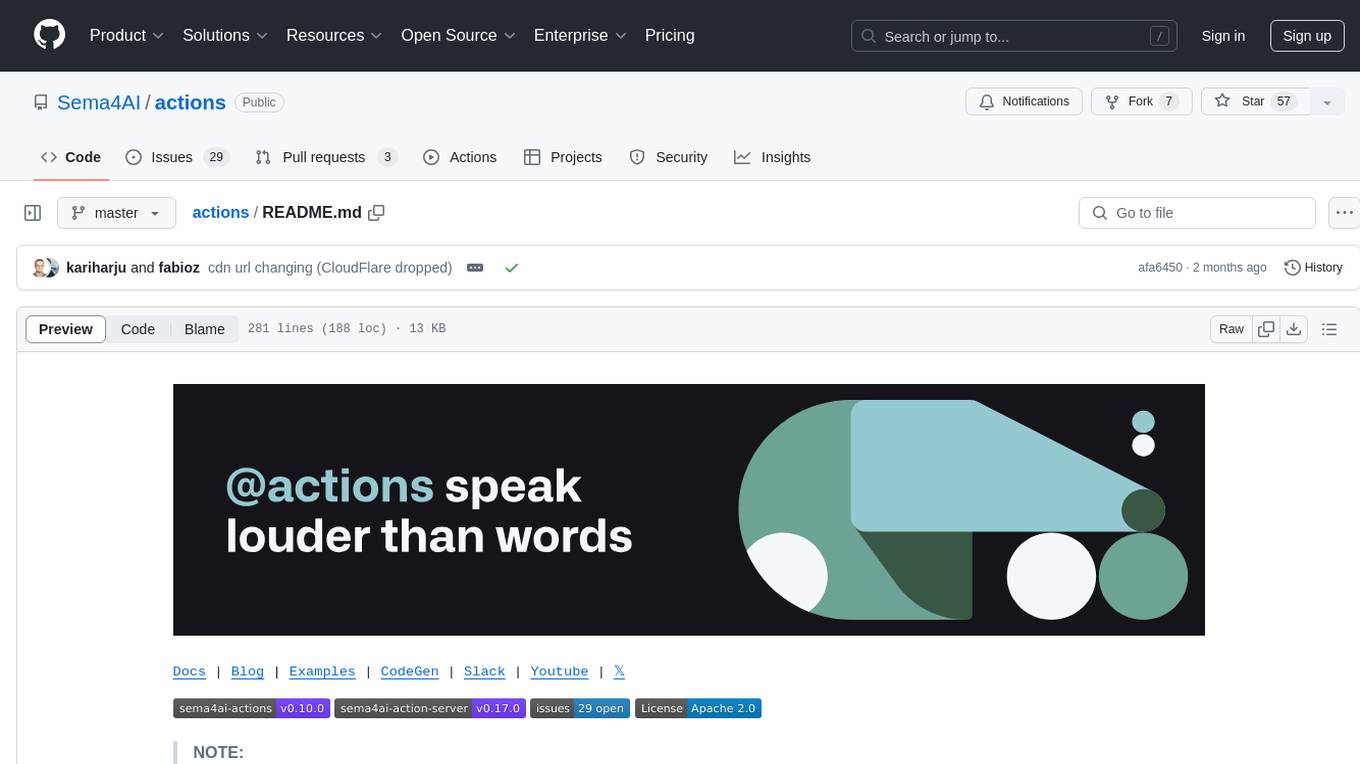
actions
Sema4.ai Action Server is a tool that allows users to build semantic actions in Python to connect AI agents with real-world applications. It enables users to create custom actions, skills, loaders, and plugins that securely connect any AI Assistant platform to data and applications. The tool automatically creates and exposes an API based on function declaration, type hints, and docstrings by adding '@action' to Python scripts. It provides an end-to-end stack supporting various connections between AI and user's apps and data, offering ease of use, security, and scalability.

torchchat
torchchat is a codebase showcasing the ability to run large language models (LLMs) seamlessly. It allows running LLMs using Python in various environments such as desktop, server, iOS, and Android. The tool supports running models via PyTorch, chatting, generating text, running chat in the browser, and running models on desktop/server without Python. It also provides features like AOT Inductor for faster execution, running in C++ using the runner, and deploying and running on iOS and Android. The tool supports popular hardware and OS including Linux, Mac OS, Android, and iOS, with various data types and execution modes available.

Sentient
Sentient is a personal, private, and interactive AI companion developed by Existence. The project aims to build a completely private AI companion that is deeply personalized and context-aware of the user. It utilizes automation and privacy to create a true companion for humans. The tool is designed to remember information about the user and use it to respond to queries and perform various actions. Sentient features a local and private environment, MBTI personality test, integrations with LinkedIn, Reddit, and more, self-managed graph memory, web search capabilities, multi-chat functionality, and auto-updates for the app. The project is built using technologies like ElectronJS, Next.js, TailwindCSS, FastAPI, Neo4j, and various APIs.
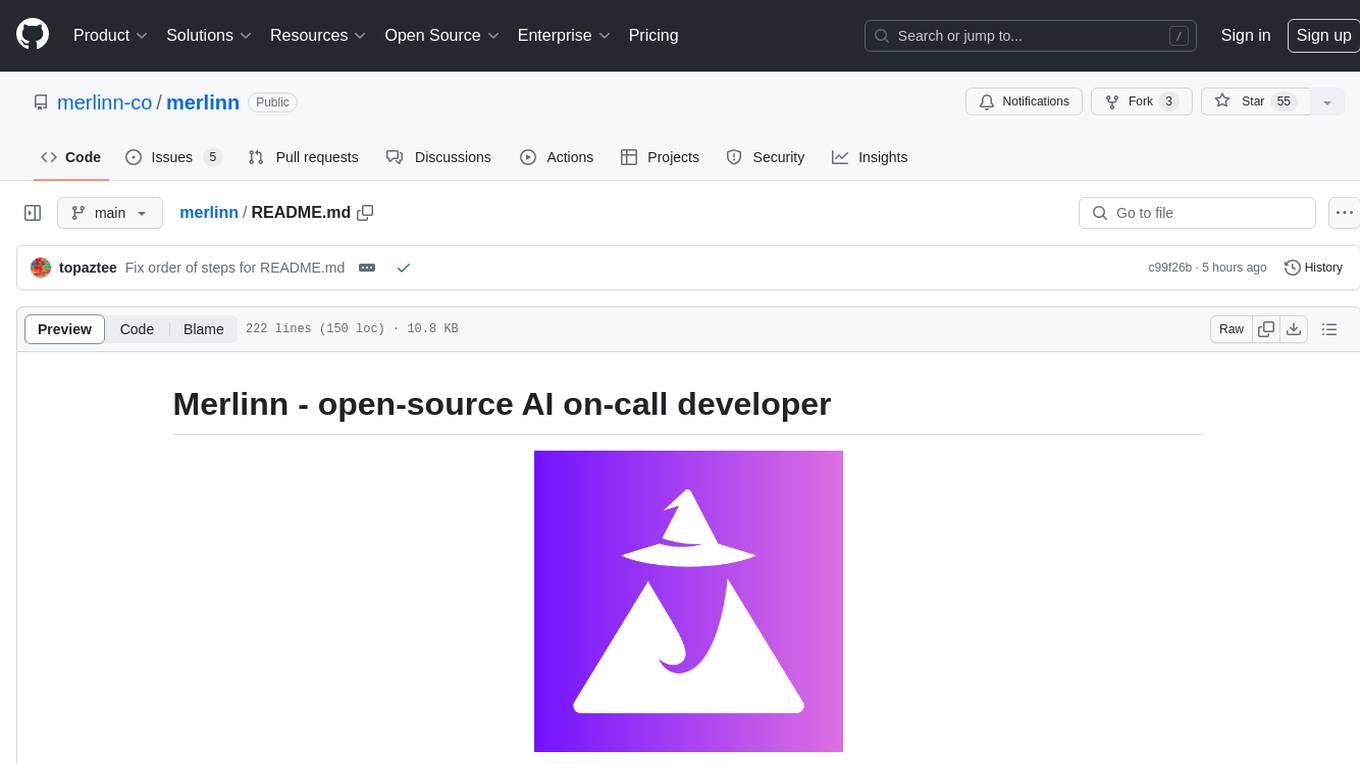
merlinn
Merlinn is an open-source AI-powered on-call engineer that automatically jumps into incidents & alerts, providing useful insights and RCA in real time. It integrates with popular observability tools, lives inside Slack, offers an intuitive UX, and prioritizes security. Users can self-host Merlinn, use it for free, and benefit from automatic RCA, Slack integration, integrations with various tools, intuitive UX, and security features.
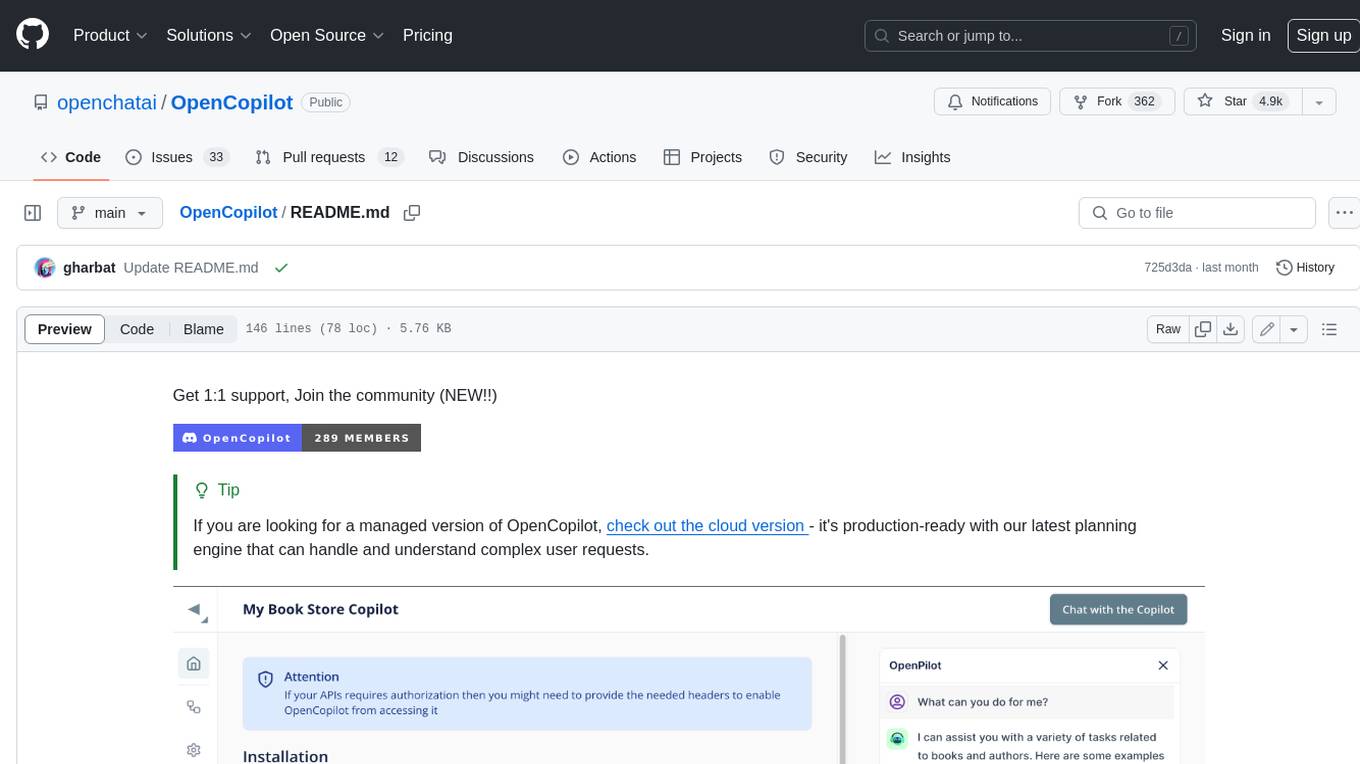
OpenCopilot
OpenCopilot allows you to have your own product's AI copilot. It integrates with your underlying APIs and can execute API calls whenever needed. It uses LLMs to determine if the user's request requires calling an API endpoint. Then, it decides which endpoint to call and passes the appropriate payload based on the given API definition.
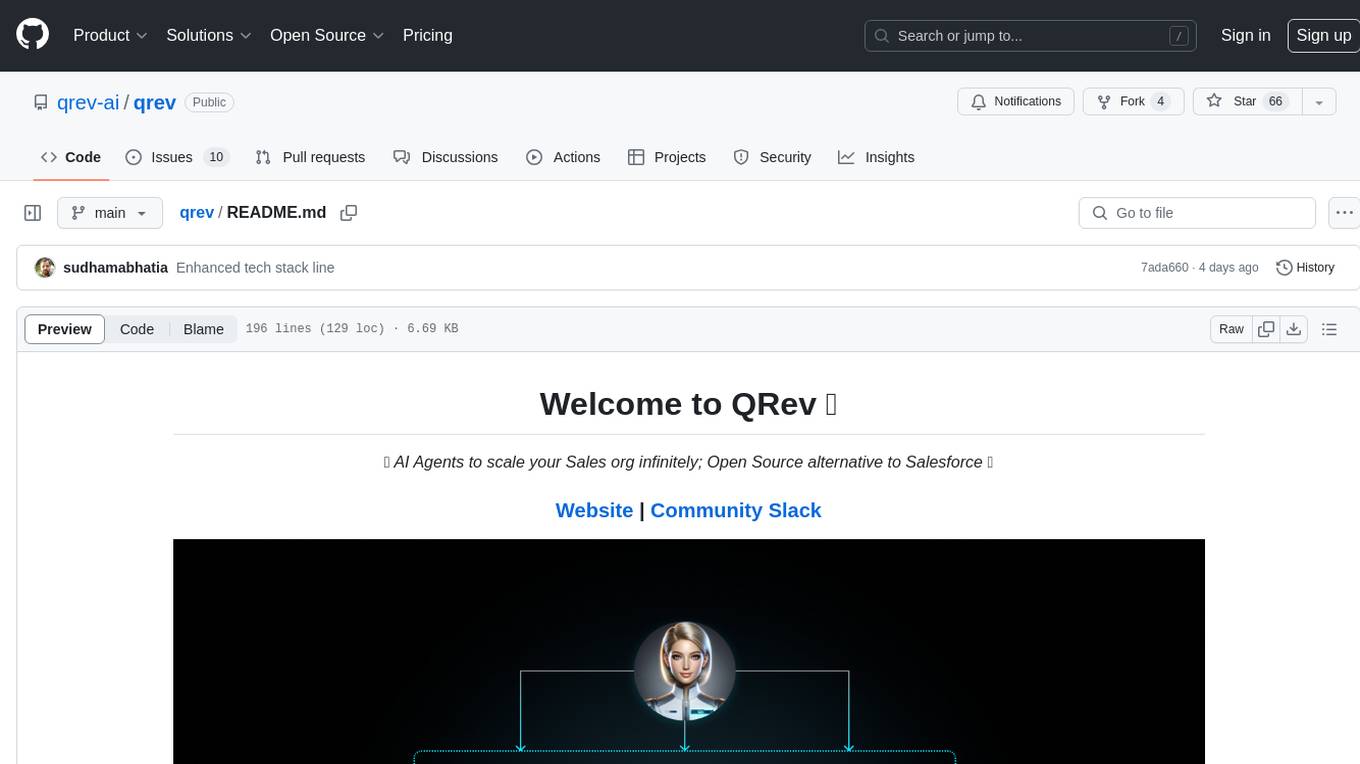
qrev
QRev is an open-source alternative to Salesforce, offering AI agents to scale sales organizations infinitely. It aims to provide digital workers for various sales roles or a superagent named Qai. The tech stack includes TypeScript for frontend, NodeJS for backend, MongoDB for app server database, ChromaDB for vector database, SQLite for AI server SQL relational database, and Langchain for LLM tooling. The tool allows users to run client app, app server, and AI server components. It requires Node.js and MongoDB to be installed, and provides detailed setup instructions in the README file.
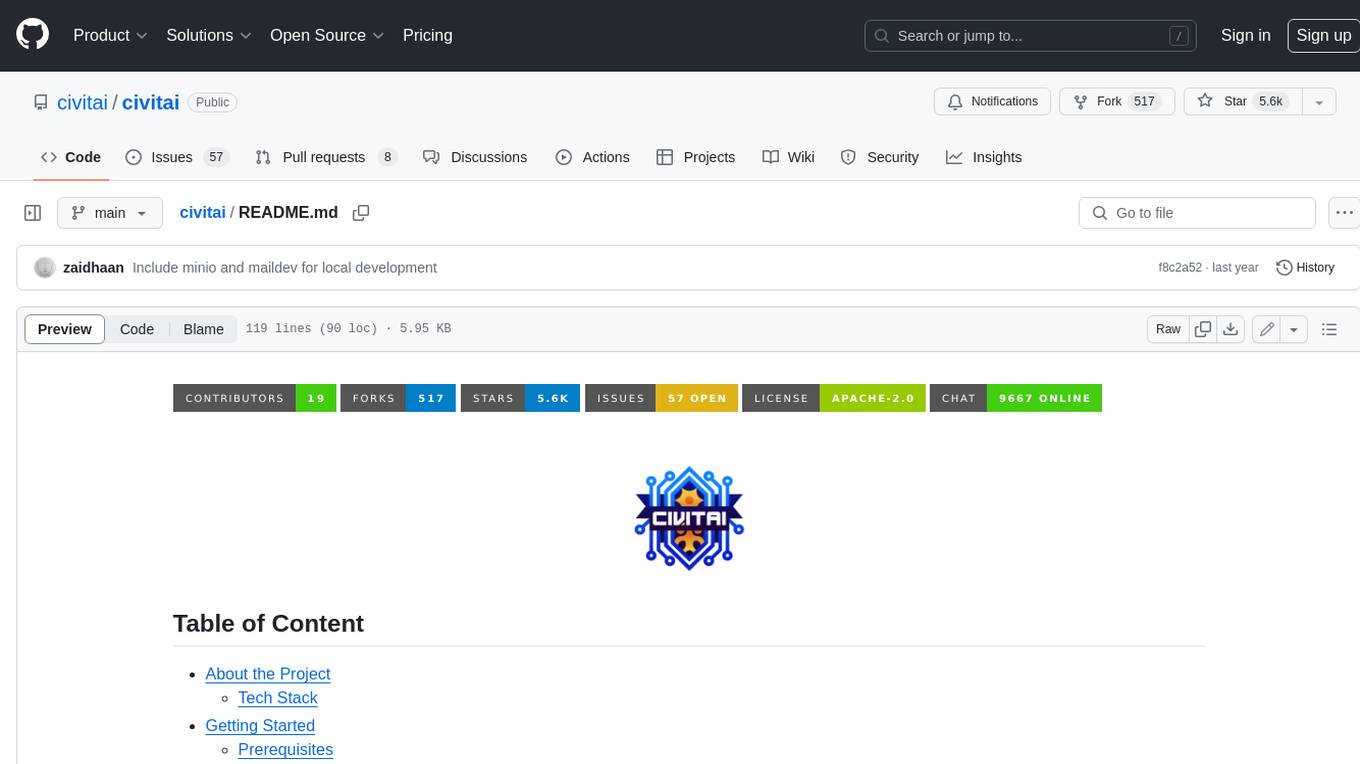
civitai
Civitai is a platform where people can share their stable diffusion models (textual inversions, hypernetworks, aesthetic gradients, VAEs, and any other crazy stuff people do to customize their AI generations), collaborate with others to improve them, and learn from each other's work. The platform allows users to create an account, upload their models, and browse models that have been shared by others. Users can also leave comments and feedback on each other's models to facilitate collaboration and knowledge sharing.

Perplexica
Perplexica is an open-source AI-powered search engine that utilizes advanced machine learning algorithms to provide clear answers with sources cited. It offers various modes like Copilot Mode, Normal Mode, and Focus Modes for specific types of questions. Perplexica ensures up-to-date information by using SearxNG metasearch engine. It also features image and video search capabilities and upcoming features include finalizing Copilot Mode and adding Discover and History Saving features.
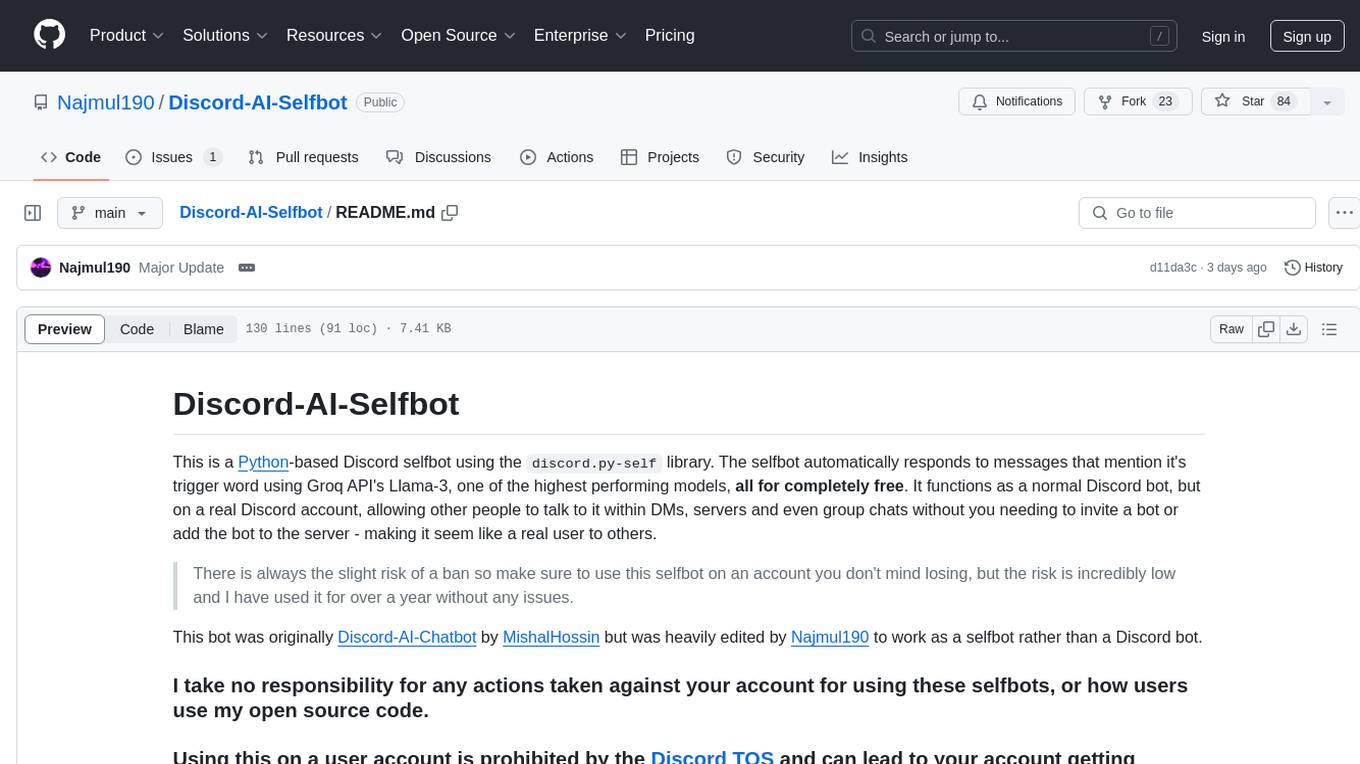
Discord-AI-Selfbot
Discord-AI-Selfbot is a Python-based Discord selfbot that uses the `discord.py-self` library to automatically respond to messages mentioning its trigger word using Groq API's Llama-3 model. It functions as a normal Discord bot on a real Discord account, enabling interactions in DMs, servers, and group chats without needing to invite a bot. The selfbot comes with features like custom AI instructions, free LLM model usage, mention and reply recognition, message handling, channel-specific responses, and a psychoanalysis command to analyze user messages for insights on personality.
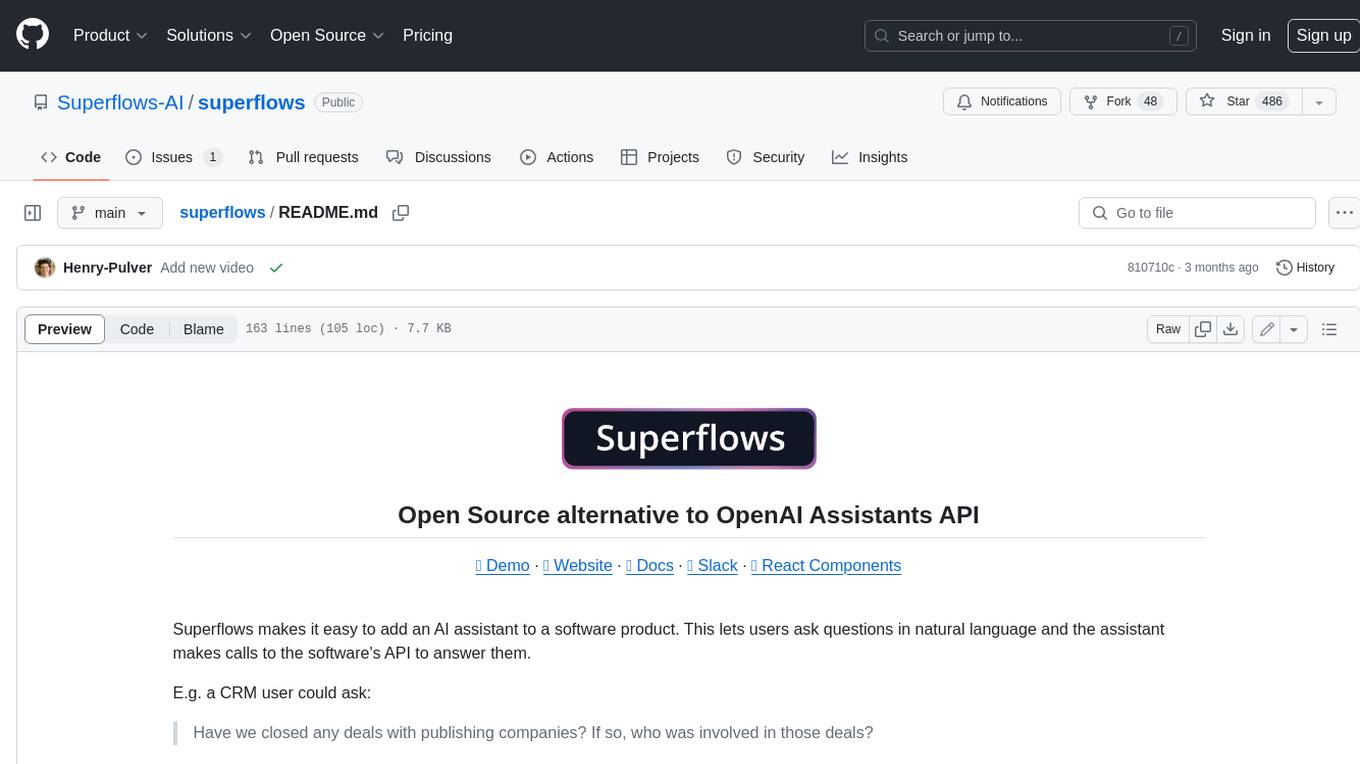
superflows
Superflows is an open-source alternative to OpenAI's Assistant API. It allows developers to easily add an AI assistant to their software products, enabling users to ask questions in natural language and receive answers or have tasks completed by making API calls. Superflows can analyze data, create plots, answer questions based on static knowledge, and even write code. It features a developer dashboard for configuration and testing, stateful streaming API, UI components, and support for multiple LLMs. Superflows can be set up in the cloud or self-hosted, and it provides comprehensive documentation and support.
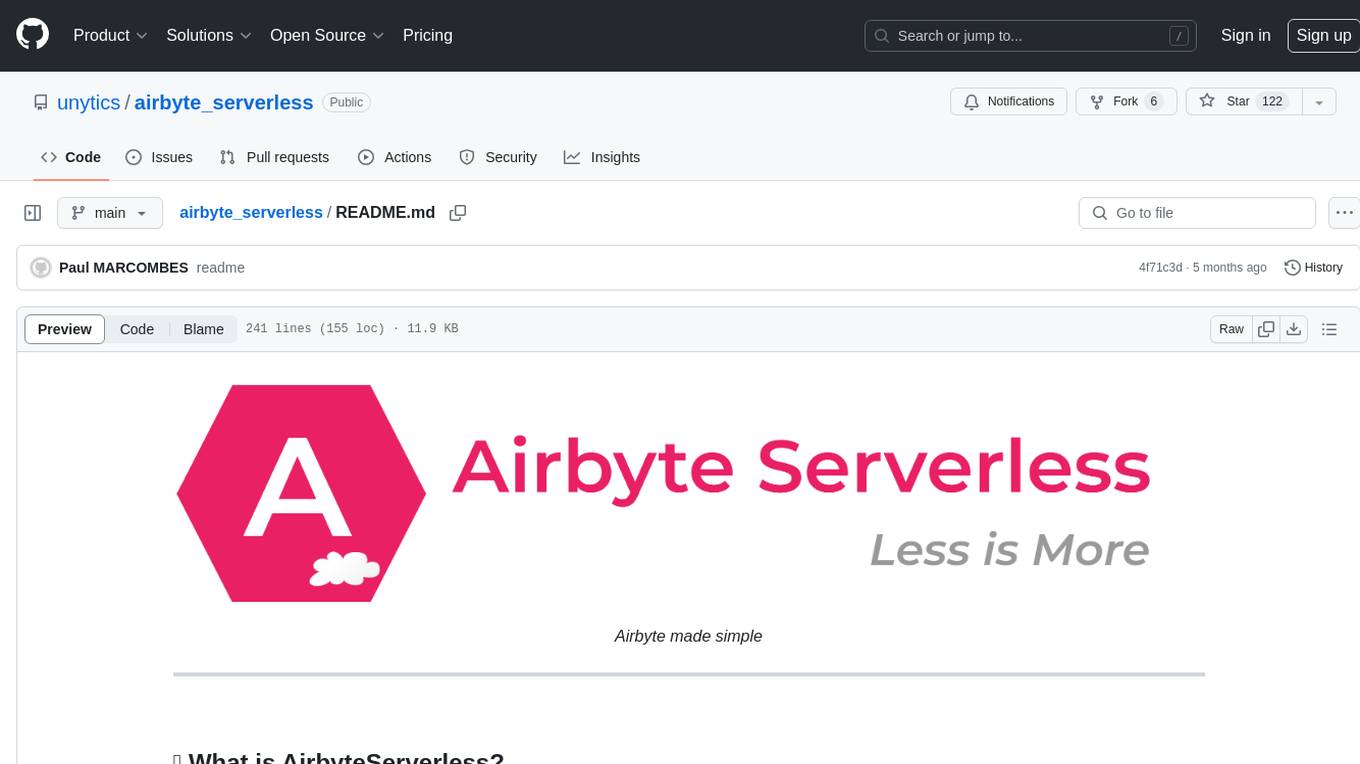
airbyte_serverless
AirbyteServerless is a lightweight tool designed to simplify the management of Airbyte connectors. It offers a serverless mode for running connectors, allowing users to easily move data from any source to their data warehouse. Unlike the full Airbyte-Open-Source-Platform, AirbyteServerless focuses solely on the Extract-Load process without a UI, database, or transform layer. It provides a CLI tool, 'abs', for managing connectors, creating connections, running jobs, selecting specific data streams, handling secrets securely, and scheduling remote runs. The tool is scalable, allowing independent deployment of multiple connectors. It aims to streamline the connector management process and provide a more agile alternative to the comprehensive Airbyte platform.
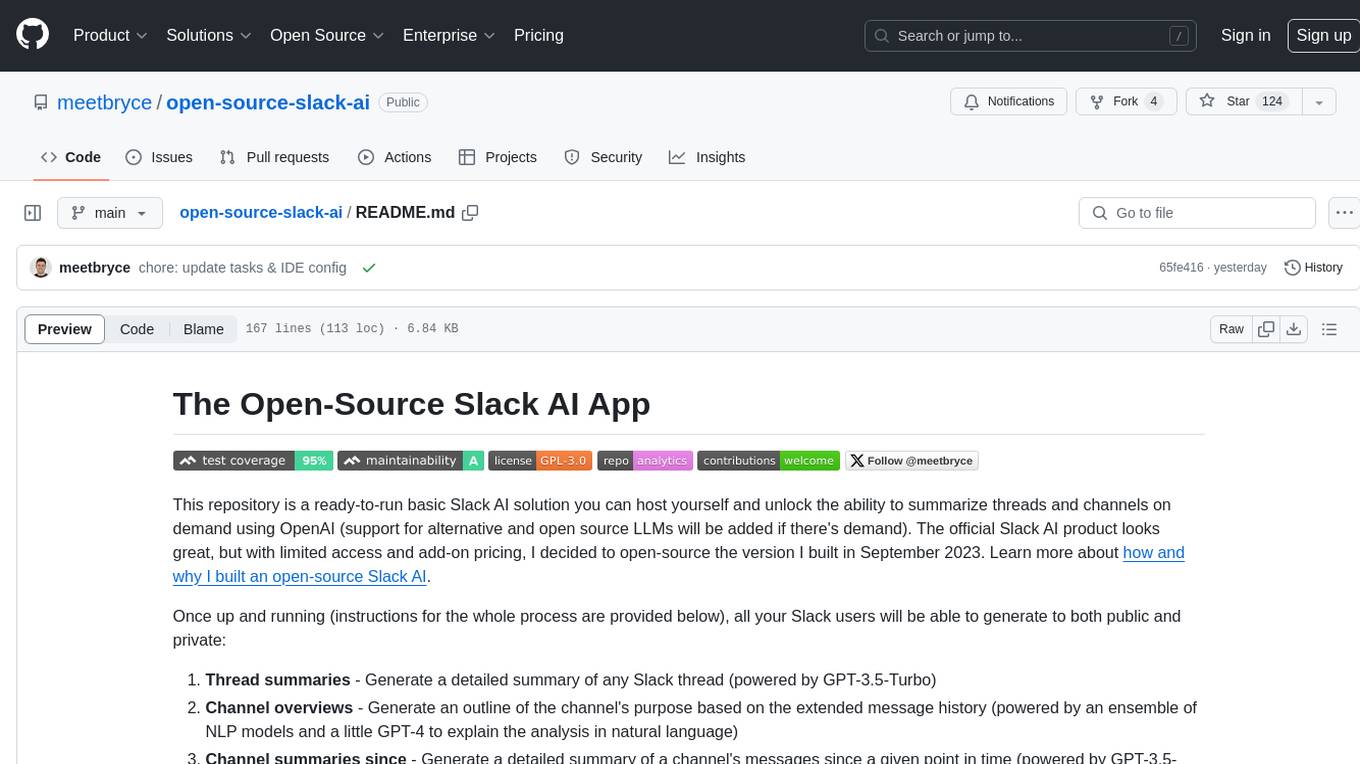
open-source-slack-ai
This repository provides a ready-to-run basic Slack AI solution that allows users to summarize threads and channels using OpenAI. Users can generate thread summaries, channel overviews, channel summaries since a specific time, and full channel summaries. The tool is powered by GPT-3.5-Turbo and an ensemble of NLP models. It requires Python 3.8 or higher, an OpenAI API key, Slack App with associated API tokens, Poetry package manager, and ngrok for local development. Users can customize channel and thread summaries, run tests with coverage using pytest, and contribute to the project for future enhancements.
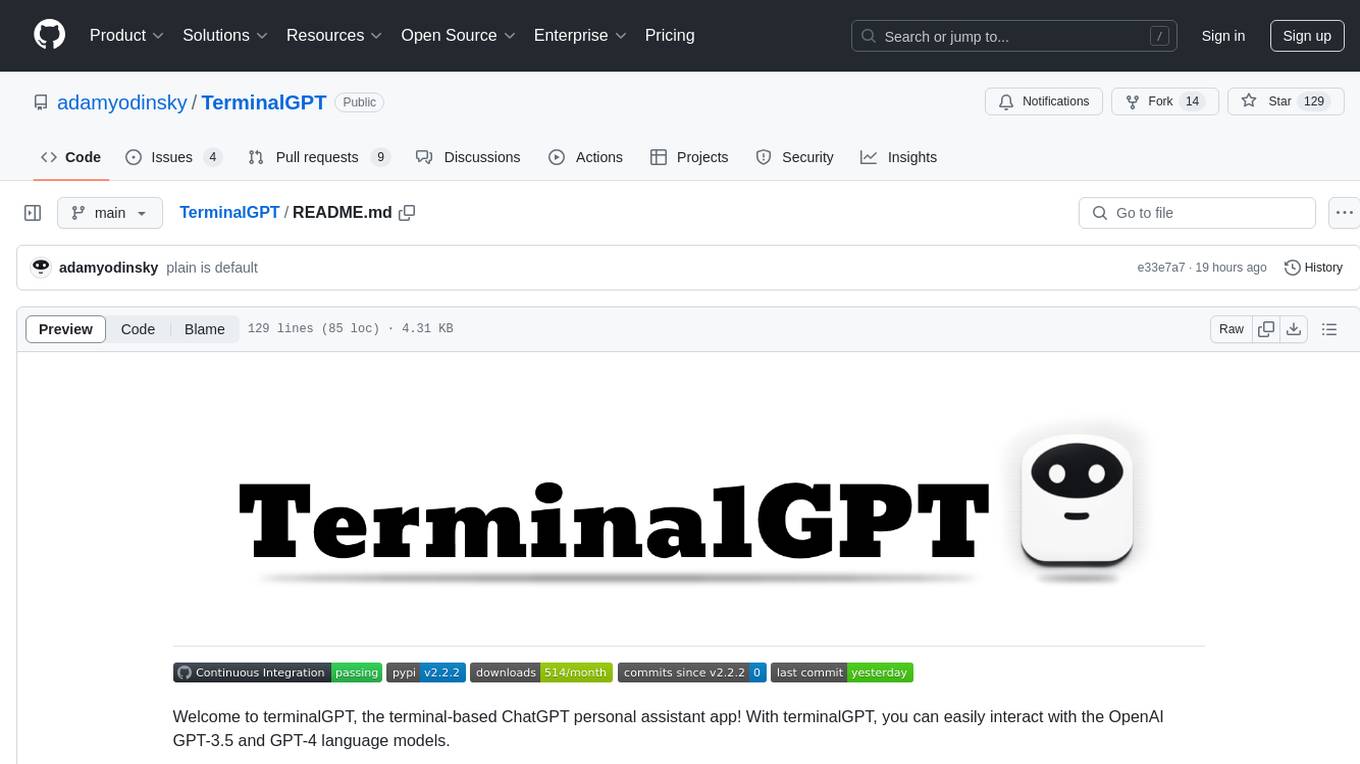
TerminalGPT
TerminalGPT is a terminal-based ChatGPT personal assistant app that allows users to interact with OpenAI GPT-3.5 and GPT-4 language models. It offers advantages over browser-based apps, such as continuous availability, faster replies, and tailored answers. Users can use TerminalGPT in their IDE terminal, ensuring seamless integration with their workflow. The tool prioritizes user privacy by not using conversation data for model training and storing conversations locally on the user's machine.
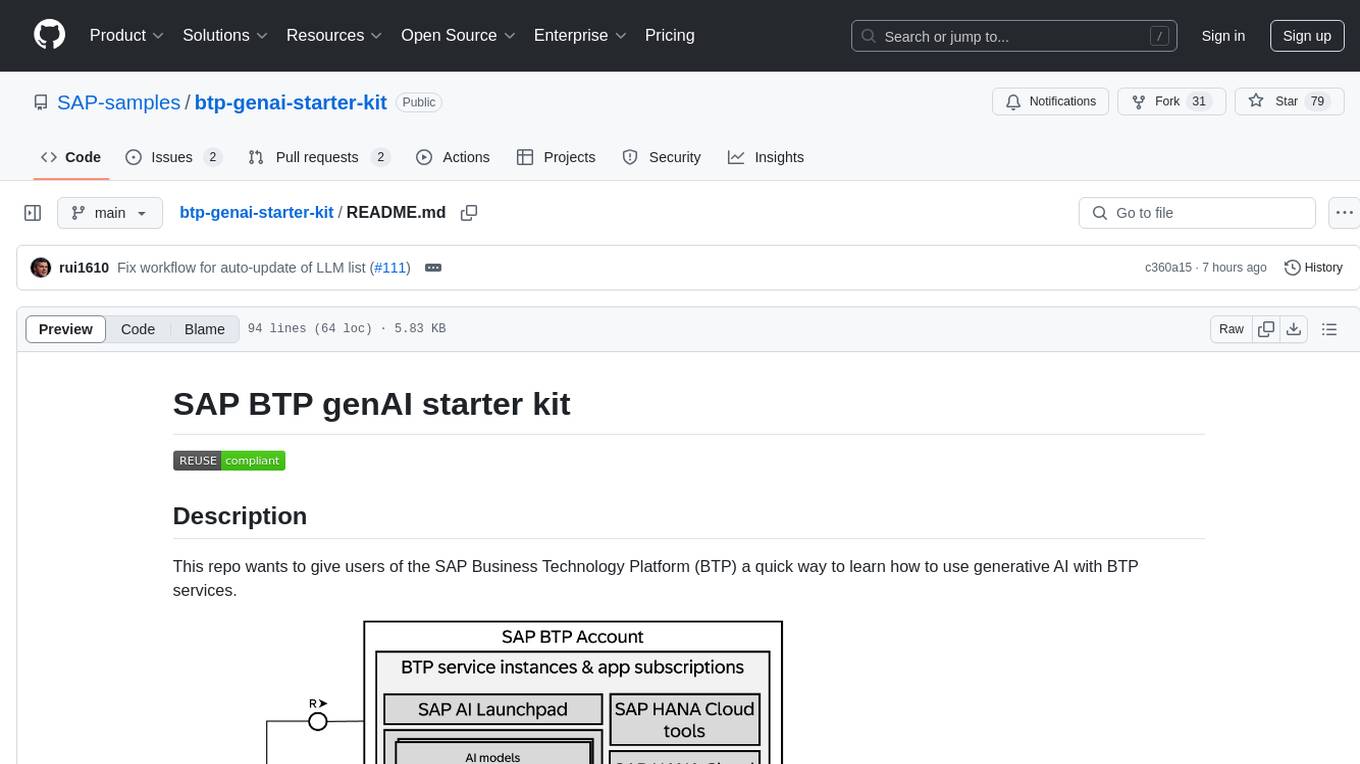
btp-genai-starter-kit
This repository provides a quick way for users of the SAP Business Technology Platform (BTP) to learn how to use generative AI with BTP services. It guides users through setting up the necessary infrastructure, deploying AI models, and running genAI experiments on SAP BTP. The repository includes scripts, examples, and instructions to help users get started with generative AI on the SAP BTP platform.
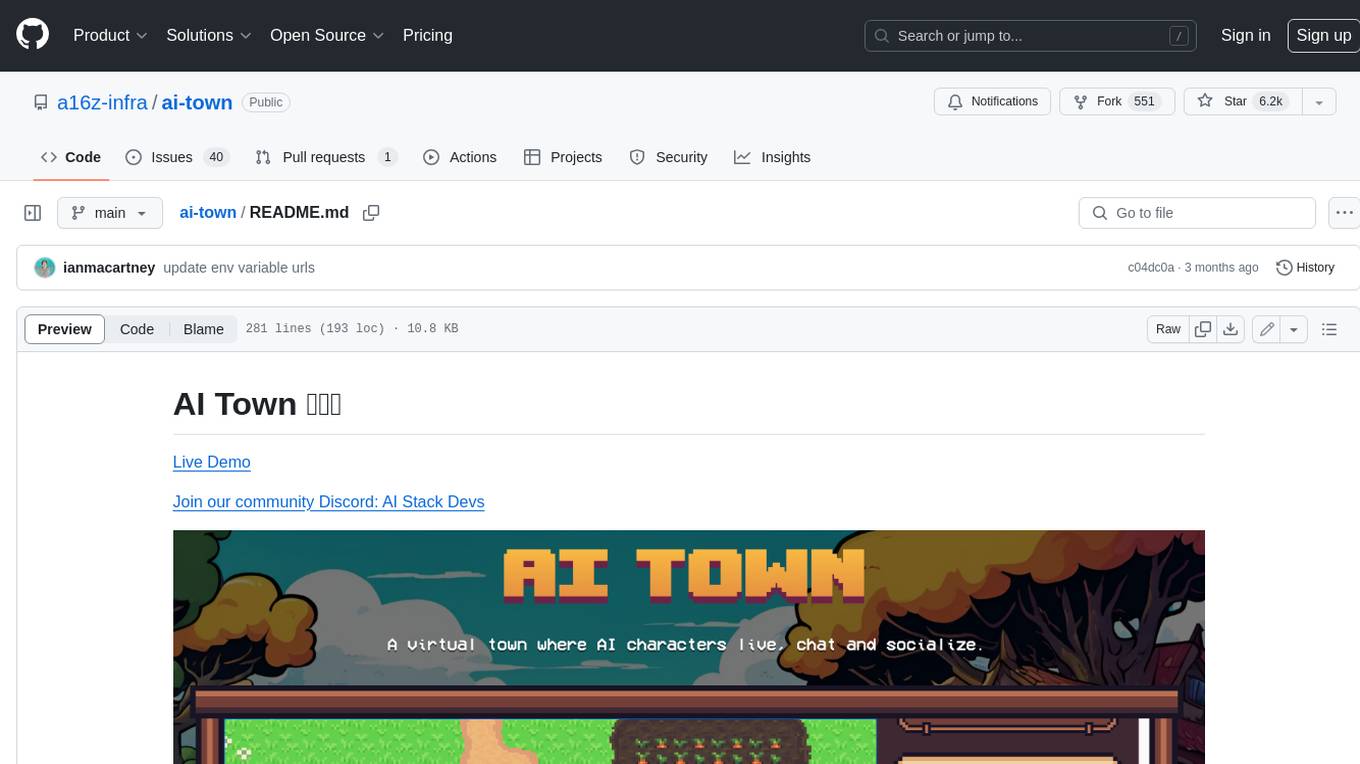
ai-town
AI Town is a virtual town where AI characters live, chat, and socialize. This project provides a deployable starter kit for building and customizing your own version of AI Town. It features a game engine, database, vector search, auth, text model, deployment, pixel art generation, background music generation, and local inference. You can customize your own simulation by creating characters and stories, updating spritesheets, changing the background, and modifying the background music.
For similar tasks

robocorp
Robocorp is a platform that allows users to create, deploy, and operate Python automations and AI actions. It provides an easy way to extend the capabilities of AI agents, assistants, and copilots with custom actions written in Python. Users can create and deploy tools, skills, loaders, and plugins that securely connect any AI Assistant platform to their data and applications. The Robocorp Action Server makes Python scripts compatible with ChatGPT and LangChain by automatically creating and exposing an API based on function declaration, type hints, and docstrings. It simplifies the process of developing and deploying AI actions, enabling users to interact with AI frameworks effortlessly.
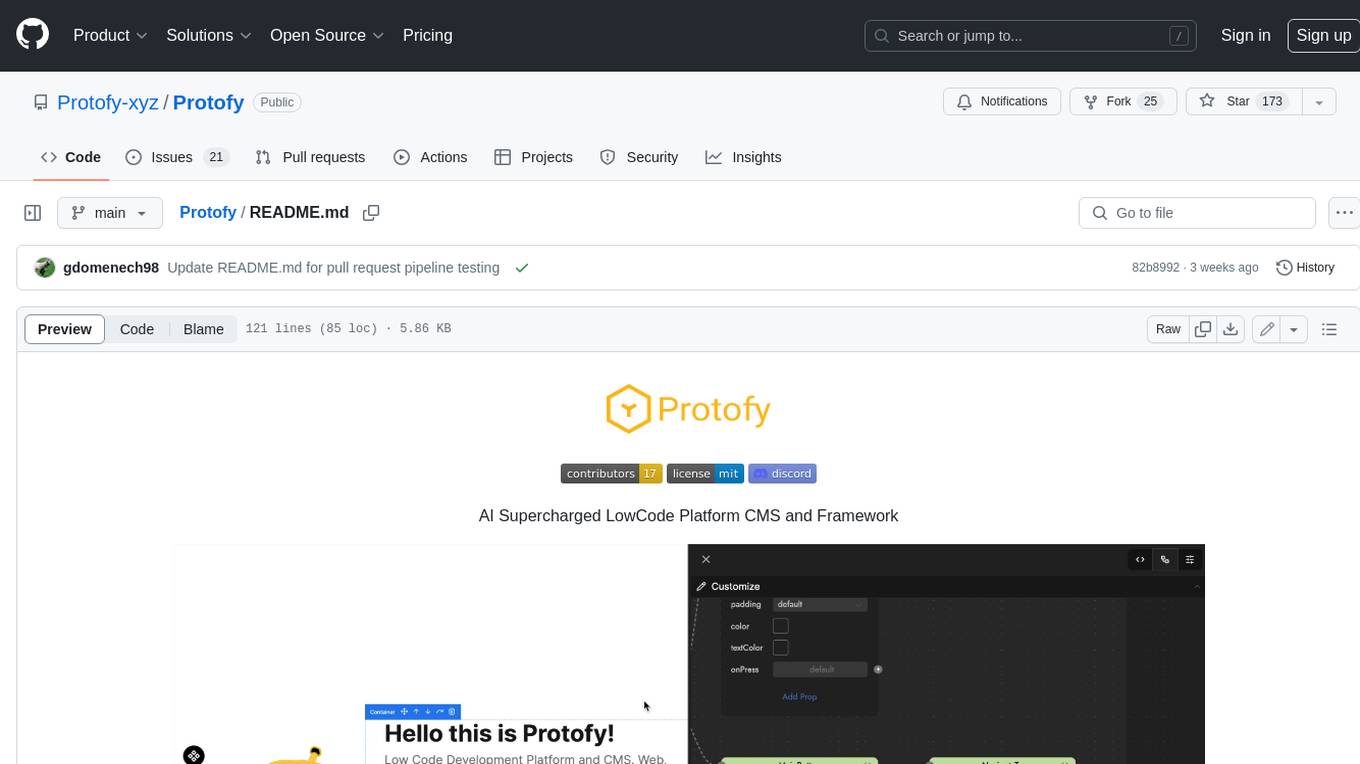
Protofy
Protofy is a full-stack, batteries-included low-code enabled web/app and IoT system with an API system and real-time messaging. It is based on Protofy (protoflow + visualui + protolib + protodevices) + Expo + Next.js + Tamagui + Solito + Express + Aedes + Redbird + Many other amazing packages. Protofy can be used to fast prototype Apps, webs, IoT systems, automations, or APIs. It is a ultra-extensible CMS with supercharged capabilities, mobile support, and IoT support (esp32 thanks to esphome).

Genkit
Genkit is an open-source framework for building full-stack AI-powered applications, used in production by Google's Firebase. It provides SDKs for JavaScript/TypeScript (Stable), Go (Beta), and Python (Alpha) with unified interface for integrating AI models from providers like Google, OpenAI, Anthropic, Ollama. Rapidly build chatbots, automations, and recommendation systems using streamlined APIs for multimodal content, structured outputs, tool calling, and agentic workflows. Genkit simplifies AI integration with open-source SDK, unified APIs, and offers text and image generation, structured data generation, tool calling, prompt templating, persisted chat interfaces, AI workflows, and AI-powered data retrieval (RAG).
For similar jobs

promptflow
**Prompt flow** is a suite of development tools designed to streamline the end-to-end development cycle of LLM-based AI applications, from ideation, prototyping, testing, evaluation to production deployment and monitoring. It makes prompt engineering much easier and enables you to build LLM apps with production quality.

deepeval
DeepEval is a simple-to-use, open-source LLM evaluation framework specialized for unit testing LLM outputs. It incorporates various metrics such as G-Eval, hallucination, answer relevancy, RAGAS, etc., and runs locally on your machine for evaluation. It provides a wide range of ready-to-use evaluation metrics, allows for creating custom metrics, integrates with any CI/CD environment, and enables benchmarking LLMs on popular benchmarks. DeepEval is designed for evaluating RAG and fine-tuning applications, helping users optimize hyperparameters, prevent prompt drifting, and transition from OpenAI to hosting their own Llama2 with confidence.

MegaDetector
MegaDetector is an AI model that identifies animals, people, and vehicles in camera trap images (which also makes it useful for eliminating blank images). This model is trained on several million images from a variety of ecosystems. MegaDetector is just one of many tools that aims to make conservation biologists more efficient with AI. If you want to learn about other ways to use AI to accelerate camera trap workflows, check out our of the field, affectionately titled "Everything I know about machine learning and camera traps".

leapfrogai
LeapfrogAI is a self-hosted AI platform designed to be deployed in air-gapped resource-constrained environments. It brings sophisticated AI solutions to these environments by hosting all the necessary components of an AI stack, including vector databases, model backends, API, and UI. LeapfrogAI's API closely matches that of OpenAI, allowing tools built for OpenAI/ChatGPT to function seamlessly with a LeapfrogAI backend. It provides several backends for various use cases, including llama-cpp-python, whisper, text-embeddings, and vllm. LeapfrogAI leverages Chainguard's apko to harden base python images, ensuring the latest supported Python versions are used by the other components of the stack. The LeapfrogAI SDK provides a standard set of protobuffs and python utilities for implementing backends and gRPC. LeapfrogAI offers UI options for common use-cases like chat, summarization, and transcription. It can be deployed and run locally via UDS and Kubernetes, built out using Zarf packages. LeapfrogAI is supported by a community of users and contributors, including Defense Unicorns, Beast Code, Chainguard, Exovera, Hypergiant, Pulze, SOSi, United States Navy, United States Air Force, and United States Space Force.

llava-docker
This Docker image for LLaVA (Large Language and Vision Assistant) provides a convenient way to run LLaVA locally or on RunPod. LLaVA is a powerful AI tool that combines natural language processing and computer vision capabilities. With this Docker image, you can easily access LLaVA's functionalities for various tasks, including image captioning, visual question answering, text summarization, and more. The image comes pre-installed with LLaVA v1.2.0, Torch 2.1.2, xformers 0.0.23.post1, and other necessary dependencies. You can customize the model used by setting the MODEL environment variable. The image also includes a Jupyter Lab environment for interactive development and exploration. Overall, this Docker image offers a comprehensive and user-friendly platform for leveraging LLaVA's capabilities.

carrot
The 'carrot' repository on GitHub provides a list of free and user-friendly ChatGPT mirror sites for easy access. The repository includes sponsored sites offering various GPT models and services. Users can find and share sites, report errors, and access stable and recommended sites for ChatGPT usage. The repository also includes a detailed list of ChatGPT sites, their features, and accessibility options, making it a valuable resource for ChatGPT users seeking free and unlimited GPT services.

TrustLLM
TrustLLM is a comprehensive study of trustworthiness in LLMs, including principles for different dimensions of trustworthiness, established benchmark, evaluation, and analysis of trustworthiness for mainstream LLMs, and discussion of open challenges and future directions. Specifically, we first propose a set of principles for trustworthy LLMs that span eight different dimensions. Based on these principles, we further establish a benchmark across six dimensions including truthfulness, safety, fairness, robustness, privacy, and machine ethics. We then present a study evaluating 16 mainstream LLMs in TrustLLM, consisting of over 30 datasets. The document explains how to use the trustllm python package to help you assess the performance of your LLM in trustworthiness more quickly. For more details about TrustLLM, please refer to project website.

AI-YinMei
AI-YinMei is an AI virtual anchor Vtuber development tool (N card version). It supports fastgpt knowledge base chat dialogue, a complete set of solutions for LLM large language models: [fastgpt] + [one-api] + [Xinference], supports docking bilibili live broadcast barrage reply and entering live broadcast welcome speech, supports Microsoft edge-tts speech synthesis, supports Bert-VITS2 speech synthesis, supports GPT-SoVITS speech synthesis, supports expression control Vtuber Studio, supports painting stable-diffusion-webui output OBS live broadcast room, supports painting picture pornography public-NSFW-y-distinguish, supports search and image search service duckduckgo (requires magic Internet access), supports image search service Baidu image search (no magic Internet access), supports AI reply chat box [html plug-in], supports AI singing Auto-Convert-Music, supports playlist [html plug-in], supports dancing function, supports expression video playback, supports head touching action, supports gift smashing action, supports singing automatic start dancing function, chat and singing automatic cycle swing action, supports multi scene switching, background music switching, day and night automatic switching scene, supports open singing and painting, let AI automatically judge the content.




